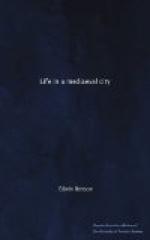Memory of the Jews, the money-dealers of other times, survived if only from the harrowing stories of the various persecutions that had taken place all over England, and not least in York. The Jews had been expelled from the country by Edward I., with the encouragement of the Church, in 1290, partly for economic, partly for religious reasons. Their supplanters, the Italian bankers, whom Edward favoured, soon acquired from their trading an unpopularity equal to that of the Jews as traders. The rise of the middle class had coincided with the release of money in coin from the hoards of the Jews, and from the coffers of the Knights Templars, whose order was abolished in 1312.
The merchant and trading class, apart from the nobility and the Church, formed the bulk of the people of the nation. They were the solid part of the nation, that paid taxes, that supplied clerks, monks, and priests, that liberally supported the Church, that kept the nation progressive and solvent by commercial undertakings.
The professions, as we use the term to-day, had not as yet attained sufficient importance for them to form a distinct class division. There were a few capable physicians, but generally the practice of medicine was shared by the Church and the barber-surgeons. Priests and officers of the Church had the privilege peculiar to the Church by which even a poor but intellectually capable man could rise to high office and become the social equal of nobles. Architecture was practised by master-masons under the patronage of leading ecclesiastics and nobles. Teaching was nearly all the work of the Church. The lawyers, however, were already to be distinguished from those who gained profit by dealing in goods, for they made profit from transactions on paper, from managing the interests of others, from trading in their own acute mental powers.
The wool trade was by far the most extensive and flourishing trade of England in the fourteenth and fifteenth centuries. This was the trade that made England great commercially. Wool was England’s raw material and the source of most of her wealth. The numerous monasteries had huge sheep-farms. Edward III. had encouraged foreign clothworkers to settle in England (in York, as in other places). The first York craftsmen to be incorporated were the weavers, who received a charter from Henry II., in return for which they paid a tax to the King for the customs and liberties he granted them. The weavers were the largest and wealthiest body of traders.




